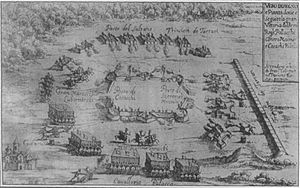Battle of Cudnów
| Battle of Chudnov (Cudnów) | |||||||
|---|---|---|---|---|---|---|---|
| Part of Russo-Polish War (1654–1667) | |||||||
 Polish troops besiege the camp of the Russian forces led by Vasily Sheremetev and Timofey Tsetsura. |
|||||||
|
|||||||
| Belligerents | |||||||
|
|
|
||||||
| Commanders and leaders | |||||||
|
Jerzy Sebastian Lubomirski Safer Giray |
Vasily Sheremetev Timofey Tsetsura |
||||||
| Strength | |||||||
| 28,000 Poles with 20 artillery pieces 12,000 Tatars |
15,000 Russians with 48 artillery pieces 15,000 Cossacks with several artillery pieces (under Tsetsura; not counting 20,000 under Khmelnytsky) |
||||||
| Casualties and losses | |||||||
| Poles: 2,700 dead, 2,500 wounded Tatars: 400 dead, 600 wounded |
Russians: 2,300 dead, 2,000 wounded, 12,500 captive and all artillery Cossacks: 1,900 dead, 2,000 wounded, 8,000 |
||||||
15,000 Russians with 48 artillery pieces
The Battle of Chudnov (Chudniv, Cudnów) took place from 14 October to 2 November 1660, between the forces of the Polish-Lithuanian Commonwealth, allied with the Crimean Tatars, and the Tsardom of Russia, allied with the Cossaks. It ended with a decisive Polish victory, and the truce of Chudnov (Polish: Cudnów). The entire Russian army, including its commander, was taken into jasyr slavery by the Tatars. The battle was the largest and most important Polish victory over the Russian forces until the battle of Warsaw in 1920.
In July 1660, tsar Alexis I of Russia ordered Vasily Sheremetev to resume the sporadic Russo-Polish War (1654–1667), and push the Poles west, taking Lwów (Lviv) and securing disputed Ukrainian territories for Russia.
In September 1660, the commander of the Russian army, Sheremetev – acting on misleading information greatly underestimating the numerical strength of the Polish army – decided to seek out and destroy the Polish forces with what he believed would be overwhelming strength (15,000 Russian soldiers and 15,000–35,000 of his Cossack allies). Sheremetev's major tactical error was to advance relying on outdated and sparse intelligence reports, and without adequate scouting; he expected only a weak army of 10,000 (in fact, it numbered only about 7,000) under Great Crown Hetman , and was unaware it was soon to be reinforced by about 12,000 men under Field Crown Hetman Jerzy Sebastian Lubomirski who had recently defeated Russian army in Lithuania.
...
Wikipedia
